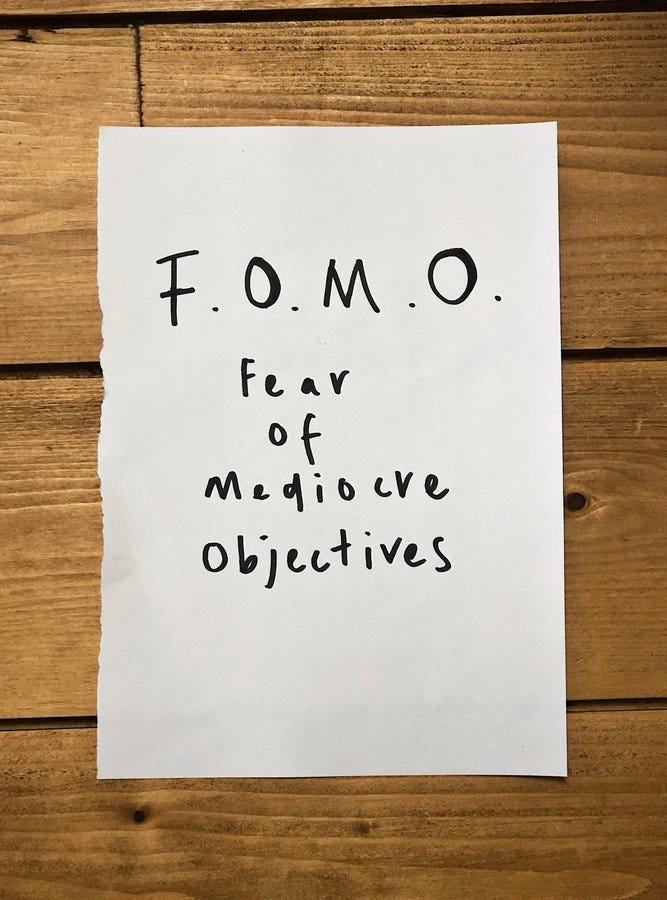February 2022 - toxic culture, boosting retention, FOMO, and employees thinking like owners
Dialogue or violence. There is no in-between
It’s good to be back in the saddle and to have found my way to your Inbox again. If you are wondering whether you missed the January issue of this newsletter, wonder no more: I didn’t send one.
We are a few days into the invasion of a sovereign country by another sovereign country… and the senseless deaths that ensue. I’m not one for pronouncements but if we can learn anything from history it is this: if we don’t discuss our differences, if we don’t talk, then the only alternative is violence. This is as true internationally as it is domestically. Technology has only exacerbated this fundamental human tendency. The only way to prevent violence is to learn to express one’s differences and learn to hear and understand the differences of others.
“Communication” is not about how eloquent or smart or well-spoken one is. It’s not about the clever tricks of rhetoric or the slick slide deck. My work as a consultant and a coach has been to invite people (I work mostly with managers) to approach communication as
a process by which all parties make themselves co-responsible for the creation of a shared understanding.
I am responsible not only to express my ideas clearly (which requires that they be clear ideas to start with), but I am also responsible to ensure that the other party has understood what I was trying to say. Conversely, it is also my responsibility to ensure that I have understood what the other party is trying to say.
This is impossible without dialogue: not only my telling you something and you telling me something, but also my asking you if I got you right and your asking me if you got me right… with the purpose of creating a shared understanding — that the outcome is that we have both understood the meaning that each other is trying to convey.
People or parties talking without the express work of creating a shared understanding are at best engaging in turn-taking monologues. They are talking at each other. They are not necessarily talking to each other. There is no dialogue.
And while listening is important and one can learn to do that better, nothing replaces the premise of effective listening: a genuine interest in what the other person has to say. If you know it all, if you’re the most experienced person in the room, if you’re the most senior person in the room, the smartest person in the room, if you think you have forgotten more about this topic than the other person will ever know then you might be far removed from having a genuine interest in what the other person has to say.
Back to my original point: Dialogue or violence. There has never been any in-between in human history.
I also want to acknowledge that we are almost two years into the Covid pandemic. And I want to celebrate the many managers who have had the humility/humanity to be aware of how much of a toll this has taken on their own lives and consequently have had a fair amount of understanding for their team members.
Okay, onwards!
Toxic culture is driving the Great Resignation
The MIT article also suggests four short-term actions to foster retention.
Boosting retention
Speaking of which, a recent Gallup study and a Harvard Business Review article align on the need to boost retention. Perhaps addressing these five questions with your direct reports might prevent the urge to leave:
How would you like to grow within this organization?
Do you feel a sense of purpose in your job?
What do you need from me to do your best work?
What are we currently not doing as a company that you feel we should do?
Do you have the opportunity to do what you do best every day?
I don’t know that I would be able to answer these five questions thoughtfully and thoroughly in a single conversation. It seems to me that addressing these questions frequently might be the way to go.
How do we get employees to think like owners?
It’s the perennial question: How do we get employees to think like owners?” This company thinks it found a solution. And it’s a pretty good one.

Your attention didn’t collapse. It was stolen
“Your brain can only produce one or two thoughts” in your conscious mind at once. That’s it. “We’re very, very single-minded.” We have “very limited cognitive capacity”. But we have fallen for an enormous delusion.
The average teenager now believes they can follow six forms of media at the same time. When neuroscientists studied this, they found that when people believe they are doing several things at once, they are actually juggling. “They’re switching back and forth. They don’t notice the switching because their brain sort of papers it over to give a seamless experience of consciousness, but what they’re actually doing is switching and reconfiguring their brain moment-to-moment, task-to-task – [and] that comes with a cost.” (…) You have to remember what you were doing before, and you have to remember what you thought about it. When this happens, the evidence shows that “your performance drops. You’re slower. All as a result of the switching.”
This is called the “switch-cost effect”. It means that if you check your texts while trying to work, you aren’t only losing the little bursts of time you spend looking at the texts themselves – you are also losing the time it takes to refocus afterwards, which turns out to be a huge amount.
Also,
Individual abstinence is “not the solution, for the same reason that wearing a gas mask for two days a week outside isn’t the answer to pollution. It might, for a short period of time, keep certain effects at bay, but it’s not sustainable, and it doesn’t address the systemic issues.” He said that our attention is being deeply altered by huge invasive forces in wider society. Saying the solution was to just adjust your own habits – to pledge to break up with your phone, say – was just “pushing it back on to the individual” he said, when “it’s really the environmental changes that will really make the difference”.
What to do?
To give one example: there is strong scientific evidence that stress and exhaustion ruin your attention. Today, about 35% of workers feel they can never switch off their phones because their boss might email them at any time of day or night. In France, ordinary workers decided this was intolerable and pressured their government for change – so now, they have a legal “right to disconnect”. It’s simple. You have a right to defined work hours, and you have a right to not be contacted by your employer outside those hours. Companies that break the rules get huge fines. There are lots of potential collective changes like this that can restore part of our focus.
A different article suggests that there are limits to the “right to disconnect” and that businesses are the ones that can best help employees disconnect from work. It offers a good review of the research as well as some practical suggestions.
What I think should be the real FOMO
Food for thought
“The idea that you are successful because you are smart and hardworking is pernicious and wrong, because it means everyone who is unsuccessful is stupid and lazy.” — Michael Sandel
“People who think they have climbed the greasy pole on their own misunderstand how much luck had a part to play and how society, directly or indirectly, also helped them rise.” — Minouche Shafik
I understand that a lot of last year’s book updates did not ship. Until I figure out what happened I’ll go with user error. My apologies.
Top photo by Tina Hartung on Unsplash





